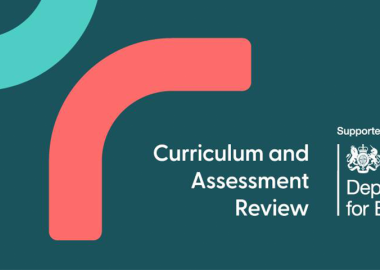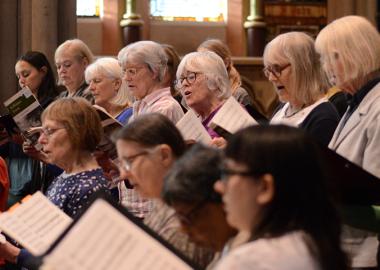In Scotland an amateur trombonist from a brass band recently got very cross about local authorities cutting back free musical instrument tuition in schools. So he started a petition which secured a resounding 11,928 signatures and a debate in the Scottish Parliament’s Petitions Committee.
Ralph Riddiough, a lawyer by day, presented the case for giving every child the opportunity, free of charge, to learn an instrument in school for as long as they want. He was joined by co-presenters Making Music’s manager in Scotland Alison Reeves and professional trumpeter Mick Cooke (of Belle and Sebastian fame).
You can see the whole debate on the Scottish Parliament website, and well worth watching it is too, because they do a great job of making the points we’d all like to make to our legislators.
Before he even came across Making Music, Ralph had also already started a similar petition to the UK government. His case is that, unless it’s free, not every child will be able to learn an instrument if they want to.
And without that universal opportunity, community music will wither and die, depriving future generations not just of the fun to be had in being part of a group, but also of all the other benefits: social networks, mental and physical well-being rewards, personal development and confidence, and so on.
VIEW THE PETITION
Ralph is aware that the educational picture in England is different. But his contention – which we agree with here at Making Music – is that we need to raise awareness that this issue is not only significant for the professional sector and its future talent pipeline, but almost more so for the around 3 million individuals and their 50,000+ music groups in the UK engaging with music as a hobby for whom this is a source of great joy and learning and often a lifeline.
What about music education hubs?
Currently state-funded instrumental music tuition in schools in England is offered by Music Education Hubs. Hubs were first set up by the government in 2012 with the aim of enabling children from all backgrounds and every part of England to have equal access to music education and similar opportunities for progression.
However, funding from the Department of Education since 2012, coupled with the many other aims mandated for hubs, has meant that most hubs are only able to offer the minimum stipulated by their funding – which is one to three terms of whole class teaching (i.e. 30 children together) on an instrument not of the children’s choosing (for the whole of the child’s 13 year school career). After that, families have to pay if their child wants to continue learning an instrument, which is just not an option for many families.
The overwhelming majority of schools charge for instrument tuition, whether one to one or in groups and this simply means many children miss out – and therefore will find it harder, if not impossible in later life to benefit from playing in community music groups, with all the benefits that could bring to them.
For music to be truly universally available to all, we are calling for free instrumental tuition provision to be available to every child throughout their school life, not just those who can pay for it.
Leisure-time musicians can make a real difference here – we are not speaking as professionals, perhaps at risk of being perceived as ‘only’ wanting to protect their own livelihood and jobs, but as the beneficiaries of those professionals: of the music teachers, instrumental tutors, conductors, accompanists, soloists, workshop leaders, composers who teach, inspire and lead us musically in our school days and still do so when we’re adults in a band or choir.
As a nation, we need those musicians and teachers - we need them for a healthy society, for thriving communities, for happy individuals. Free instrumental tuition for all children in school is a small price to pay for that, a very modest investment indeed in civil society.
VIEW THE PETITION
More on music education
Why sign the petition? We’ve collected your questions and make the case below.
Petition
That news item refers to the latest statistics on the performance of music education hubs (MEHs) in 2016/17 (which are funded by the Department for Education, via Arts Council England), just released by (ACE).
Numbers of children being reached by whole class ensemble teaching (WCET) are indeed up to 711,241, an increase of 8.8% on the previous year, reaching 9.23% of the total school population in England. But:
- WCET is not reaching every child by any stretch of the imagination
- where it reaches them, it is only for one to three terms of their entire 13-year school life in a whole class setting, on an instrument not of their choosing
- that may mean that more children are now having at least a taster of an instrument, but after their one or three terms learning an instrument, if a child wishes to carry on, parents have to pay.
MEHs exist in England only. They were created in 2012, following the publication of the government’s National Plan for Music Education (NPME) which runs until 2020.
They were created to set up local partnerships, led by one organisation, often the former local authority music service, working with professional, educational, charity and community organisations to ensure access to music education to all children aged 5-18.
Funding comes from the Department for Education (DfE) via Arts Council England (ACE) which distributes the funding and manages and monitors MEHs.
The core roles they are tasked with are:
a) Ensure that every child aged 5-18 has the opportunity to learn a musical instrument (other than voice) through whole-class ensemble teaching programmes for ideally a year (but for a minimum of a term) of weekly tuition on the same instrument.
b) Provide opportunities to play in ensembles and to perform from an early stage.
c) Ensure that clear progression routes are available and affordable to all young people.
d) Develop a singing strategy to ensure that every pupil sings regularly and that choirs and other vocal ensembles are available in the area.
It’s true that the Department for Education, via Arts Council England (ACE), funds music education hubs in England (MEHs). In theory the hubs ‘ensure that every child aged 5-18 has the opportunity to learn a musical instrument (other than voice) through whole-class ensemble teaching programmes for ideally a year (but for a minimum of a term) of weekly tuition on the same instrument.’
But in reality, that means just one term of instrumental tuition for every child during 13 years of their schooling in a whole class setting, on an instrument not of the child’s choosing.
Most hubs do provide three terms of tuition, but after that if a child wishes to carry on, parents have to pay. The continuation rate is around 29% which is not bad, but most likely reflects the proportion of parents who understand how great music can be for kids and are able to pay for lessons – and who probably would have done so anyway, regardless of the one to three terms of whole class teaching. Arguably, the children that are missing out are likely to be the ones that need free tuition the most, because their parents cannot afford lessons or don’t want to pay for them.
The government response is technically correct, but what its funding provides is just not enough.
Making Music believes that free sustained instrumental tuition is an essential part of the accessible and inclusive music education that should be available to all children aged 5-18 years. However MEHs cannot possibly succeed with the level of funding they have and the way they have been tasked.
The numbers just released by Arts Council England (ACE) support our view. ACE distributes funding to MEHs, and manages and monitors their performance.
One of the aims of the creation of MEHs was to eliminate postcode lottery and give every child comparable access whatever their family background, whatever their parental finances, and whatever their physical or mental barriers.
Making Music believes that equitable and inclusive access to music education can be provided in schools because:
- children are already there
- that is where their education takes place
- in the same way that grammar is part of English, and algebra part of Maths – without parents being asked to pay for them separately – learning an instrument is part of music
Their own statistics tell a different story. The numbers for 2016/2017, just released by Arts Council England (ACE) on the performance of music education hubs (MEH) show an alarming drop in the number of children achieving higher standards on an instrument.
Music education hubs seem to be getting more children to achieve foundation or entry level, but intermediary and advanced levels of achievement have declined 4.5% and over 11% in just one year.
This is hardly surprising, as it is impossible to learn any instrument to an intermediate or advanced level with just one to three terms of whole class ensemble teaching, which is all the MEHs have to provide for free, and many parents will be unable to pay beyond that free offer.
Could music hubs have been created in the first place back in 2012 to address this decline??
Current funding for music education hubs (MEH) from the Department for Education (DfE), via Arts Council England (ACE), is £75m a year, so £300m over 4 years. This is not the only funding for music education hubs, it only represents about 38% of their income.
Not all of that goes into instrumental tuition (the hubs have other tasks and roles, too).
The total funding for MEHs has risen 3.5% since 2012, meaning a cut in real terms, due to inflation.
While DfE has increased their funding to £75m a year, local authority funding for MEHs has more than halved since 2012 from £14.3m to a mere £5.5m in 2016/7.
The next highest (and more slowly, but still declining) proportion of MEH income comes from school contributions, at 30%.
But this contribution, to our mind, is also under serious threat. Schools are struggling with budgets and in secondary schools, now burdened with the Ebacc success measure which does not include any of the arts, we have seen a devaluation of music as a subject.
It also means that hubs are not only having to do the work of connecting with schools and providing a service, but they have to ‘sell it’ to schools first, and schools are free not to engage with or take up the hubs’ offer. Consequently, not all schools or all pupils will have access to any of the hubs’ services, including even that basic minimum one term whole class ensemble teaching on one instrument.
The third highest proportion of hub income (rapidly rising 17% every year since 2012) comes from parents, to the tune now of £33m or 18% of MEHs total income.
These nations determine their own education policies. Scotland has Instrumental Music Services, a discretionary service provided by local authorities, and there is an annual survey published on their performance.
Leisure-time trombonist Ralph Riddiough’s successful petition has really got things moving and we’ll keep you updated with progress. Watch his session in the Scottish Parliament’s petition committee, backed by professional trumpet player Mick Cooke and our manager in Scotland, Alison Reeves (a fiddle player).
In Wales, the Assembly is now paying attention to the crisis, caused by councils’ budgetary woes, after the delivery of the Hitting The Right Note report into music education from one of its committees this summer, leading to much feedback and a discussion in the Senedd this month (at about 2 hrs in).
Making Music, as well as many other organisations, responded to the report and the minister’s response to it. The recommendations point to finding national (Wales-wide) solutions, rather than leaving music education open to the postcode lottery of local authorities.
But of course Wales’ and Scotland’s residents - you can also support the petition to the UK Parliament Please sign!
We do not as yet know much about the situation in Northern Ireland, but we’d be very pleased to learn more from any members there.
- Children are receiving a minimum of one term of whole class teaching, in an instrument not of their own choosing, during their entire 13-year school career.
- Beyond that, parents are having to pay – and many can’t – what does that mean for access and inclusivity?
- Children given this opportunity will benefit their whole lives from this investment, and so will their communities, from the varied and plentiful music groups which will continue to flourish in their midst.
- Community music will suffer in the next decades if this and subsequent generations of school children are not offered free sustained instrumental tuition at school.
- Music tuition should be a statutory provision, so government can no longer claim it’s local authorities’, or parents’, or music education hubs’ responsibility; it is their responsibility, just as Maths or English or Geography.
- This is not a cost - it is an investment in physical, mental, social wellbeing, in communities and in the future of a civil society.
- This investment in civil society will pay back the pounds ploughed into it, literally, through reduced use of the NHS, social care and policing.
This petition is our way, as leisure-time musicians who play music in a group for fun, to raise the issue to government about all the other benefits of a wide-ranging music education for children – and these are the benefits which will accrue to the 95% of the population which will not become professional musicians or work in the music industry.











